
English (961)
Children categories
BRAC’s executive director, Dr. Mahabub Hossain selected one of the 500 most powerful people in the world
02 May 2013, Dhaka. Dr. Mahabub Hossain, executive director of BRAC, has been selected as one of the 500 most powerful people in the world by Foreign Policy – a global magazine of politics and economics. Dr Hossain is the only one chosen from Bangladesh to have claimed a position in this very prestigious power map.
The Foreign Policy adheres to a ‘list of lists’ approach by which they consult various distinguished and globally influential sources like Fortune Global 500, Forbes World’s Most Powerful People, World 500, Top 100 NGOs, International Media Corporations, World University Rankings, Wall Street Journal Market Watch and such others, and pick 500 people who have proven to possess the outstanding capability of influencing global trajectories. In February 2013, BRAC was ranked number one among the top 100 NGOs in the world.
Dr Hossain joined as Executive Director of BRAC in June 2007. Prior to joining BRAC, he was head of the Social Sciences Division at the International Rice Research Institute (IRRI), Philippines, and coordinator of the Consortium for Unfavourable Rice Environments (CURE) in Asia. Dr Hossain began his career in 1970, as a staff economist at the Bangladesh Institute of Development Studies (former PIDE) and rose through the ranks to become its director general during 1988-91. He also worked as a visiting scientist at the Institute of Developing Economies in Tokyo (1981), the International Food Policy Research Institute, Washington DC (1985-87), and the Overseas Development Institute, London (1990).
Dr Hossain received his MA in Economics from Dhaka University in 1969 and PhD in Economics from Cambridge University, England in 1977. His major area of research interest is on the rural development policies. Dr Hossain serves as a member of the Board of Governors at Bangladesh Agriculture University, Mymensigh, and BRAC University. He is a founding member of the North-South University Foundation, and a member of the Advisory Council of the CGIAR Harvest Plus Project run by IFPRI and CIAT, the Rice Advisory Council of the Syngenta Corporation for Asia and the Pacific. He is the Chairperson of Bangladesh Rice Foundation, a civil society think tank on rice policies. He is also a member of the Global Knowledge Advisory Commission of The World Bank.
Full list is available here: http://www.foreignpolicy.com/articles/2013/04/29/the_500_most_powerful_people_in_the_world
BRAC launches LEAD project in Tanzania
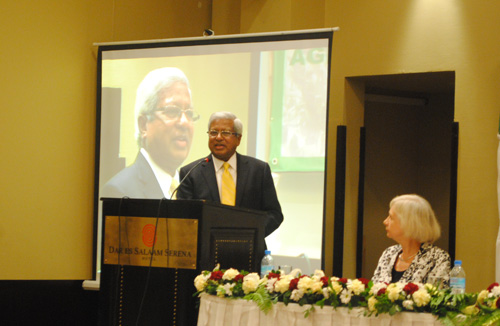
27 April 2013, Dhaka. On 23 April 2013, BRAC successfully launched the livelihood enhancement through agricultural development (LEAD) project in Tanzania. This four-year long project is a collaborative initiative of UK government and BRAC which will be implemented in 18 regions in Tanzania. The project seeks to increase rural income, build capacity of smallholder farmers, and improve agriculture productivity and food security. The project consists of two main components –agriculture (maize) and livestock (poultry), and will work directly with 48,000 poultry farmers in the country to build their capacity, assist them in accessing high quality farming inputs, and creating marketing facilities for their produce.
BRAC’s Founder Chairperson, Sir Fazle Hasan Abed chaired the ceremony. Also in attendance were the Minister for Livestock and Fisheries development, Dr David Mathayo; British High Commissioner to Tanzania Dianna Melrose; and Deputy Minister in the Vice-President’s office (Environment) Mr Charles Kitwanqa.
BRAC launches food security project in Liberia
15 April 2013, Dhaka. On April 11, 2013, BRAC launched a 3 year long food security project in Liberia aiming to increase food security in poor rural parts of the country through production, processing and marketing of livestock. The project was launched in collaboration with the ministry of agriculture and the European Union Delegation to Liberia.
The launching ceremony took place at the Corina Hotel in Monorvia, where findings of a recent market survey conducted by BRAC Liberia research unit were presented. The project is expected to reduce poverty by increasing food security through improved sustainable livestock production amongst 12,650 farmers, increasing household incomes and developing the capacity of the local relevant institutions to enable them for developing national livestock strategy.
The national livestock coordinator at the ministry of agriculture, Mrs. Elizabeth Wiles, Agriculture manager of the European Union Delegation to Liberia, Adolf Cires Alonso, Country representative of BRAC Liberia Mohammed Abdus Salam were present at the ceremony.
BRAC wins IFTDO Global Award 2013
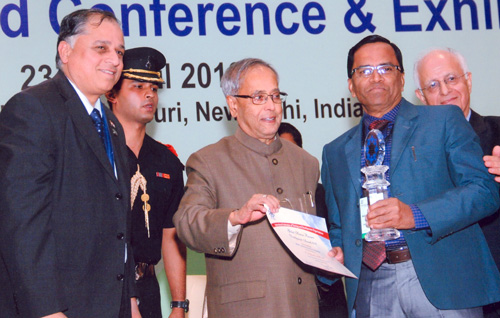
27 April 2013, Dhaka. On 25 April, 2013, BRAC was honoured with the ‘Certificate of Merit’ Award at the 42ndInternational Federation of Training and Development Organisations (IFTDO) World Conference. BRAC received this prestigious award from the Honorable President of Republic of India Shri Pranab Mukherjee in New Delhi, India, in the category of ‘Improving Quality of Working Life'. The conference was held during 23 - 27April, 2013 at the Ashok Hotel, New Delhi, India.
BRAC’s learning division received the award for their write-up on "Improving Quality ofWorking Life". BRAC believes that training is one of the strategic mechanisms for flourishing performance. The write-up competed with 29 submissions from 10 countries and was short listed to the final nine, by the Judging Panel of the IFTDO Global Awards.An esteemed award, any organisation in this category is viewed as working with high international standards in the training and development field.
The International Federation of Training and Development Organisations is
a UK based world-wide federation formed in 1972. It is committed to enhancing personal growth, human performance, productivity, and sustainable development through transfer of knowledge, skills and technology using its world-wide network.
BRAC’s response to the Savar tragedy
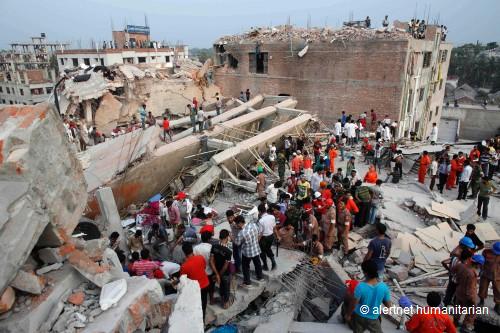
28 April 2013, Dhaka. In order to help the victims of Savar tragedy, BRAC has initiated a host of emergency support activities through multiple medical and psychosocial counseling teams. BRAC aims to continue their efforts until the end of the rescue operation, and then initiate post-trauma rehabilitation activities.
Following the incident, BRAC’s health nutrition and population programme (HNPP) sent three medical teams to Savar, Dhaka Orthopedic Hospital and Dhaka Medical College Hospital (DMCH). The Savar medical team, located immediately outside the accident site, has so far provided treatment to a total of 117 patients within the first three days. The Savar team is also providing necessary support at Enam Medical College. In addition, the team has prepared a complete list of admitted patients who will require rehabilitation later.
The BRAC team at DMCH has continued their support on the third day, which included updating the patients' profile with complete address and contact details, and re-assessing the admitted patients’ psychological conditions. This team is working jointly with the National Institute of Traumatology and Orthopaedic Rehabilitation (NITOR) and Centre for the Rehabilitation of the Paralysed (CRP), to update the common patients’ profiles, listing the patients who have lost their limbs and will require rehabilitation support later.
Aside from the medical teams, BRAC has dispatched four psychological trauma counseling teams comprising of four to six counselors from HNPP, community empowerment programme, disaster, environment and climate change programme (DECC), gender, justice and diversity programmeand BRAC University. The teams have visited DMCH, NITOR, Savar CMH and Enam Medical Hospital and assessed the counseling needs of a total of 115 admitted patients. The team will continue with the assessment process and start psychological trauma counseling support from 28April.
A special team organized by DECC and consisting of trained staff in counseling is currently providing psycho-social support to the rescued victims and the family members of those who have yet to be found. Another team has identified the number of children from BRAC schools who have lost one or both parents to the tragedy, and are receiving similar psycho-social support.
BRAC is accepting public donations for its relief efforts through BRAC UK and BRAC USA. Please click the check box on our donations page to earmark your donation for relief and rehabilitation.
BRAC USA is also accepting phone donations. To automatically contribute $10 to these efforts, please text “BRAC” to 20222 from any US mobile phone.
Contact details:
Disaster management:
Dr Babar Kabir
Sr Director, Disaster, Environment & Climate Change
Email: This email address is being protected from spambots. You need JavaScript enabled to view it.
Ph: 8801714091383
Human rights and PIL filed on labor law:
Dr Faustina Perreira
Director, Human Rights & Legal Aid Services.
Email : This email address is being protected from spambots. You need JavaScript enabled to view it.
Ph: 8801715007470
Media (Bangladesh):
Mahbubul Alam Kabir
Sr. Media Manager, Communications
BRAC
email: This email address is being protected from spambots. You need JavaScript enabled to view it.
Ph: 8801711404561
International Media:
Tasfiyah Jalil
Manager, Communications
BRAC
Email: This email address is being protected from spambots. You need JavaScript enabled to view it.
Ph: 8801730351398
BRAC will open 330 Community Girls’ schools in South Sudan
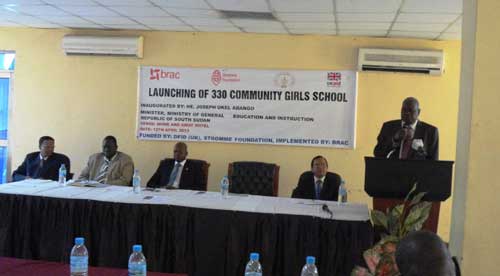
23 April 2013, Dhaka. BRAC held a launching ceremony for opening 330 community girls school in south Sudan on April 12, 2013. BRAC Education Programme in South Sudan has taken up this as a challenge considering the barriers in education in South Sudan which includes poverty, inability to pay school fees, lack of female teachers, long distance of schools etc. There are over 1.4 million children out of school and in the next five years BRAC will target 100,000 of them. A total of 9900 children from underprivileged and marginalized families will be enrolled in the 330 community schools. 330 trained female teachers will also be employed in these schools.
The launching ceremony was held at Home and Away Hotel in Juba, where HE Minister, Ministry of General Education and Instruction, HE under Secretary, Ministry of General Education and Instruction, Director General Alternative Education System and Deputy National AES Directorate were present.
The ceremony received good media coverage from the national dailies. A one hour live discussion with DG of Alternative Education and Deputy Minister, Ministry of General Education and Instruction was also aired in Radio Miriya.
Symposium held on integrated services for urban slums
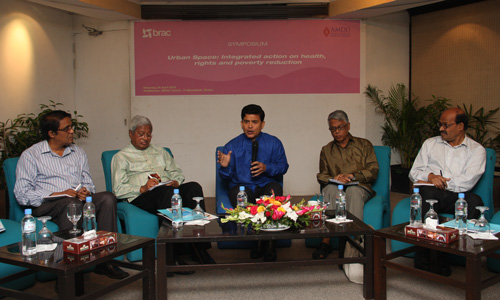
21 April 2013, Dhaka. BRAC and Averting Maternal Death and Disability programme of Mailman School of Public Health, Columbia University, co-hosted a two-day symposium on “URBAN SPACE: INTEGRATED ACTION ON HEALTH, RIGHTS AND POVERTY REDUCTION” in April 19-20, 2013 at the BRAC Centre Auditorium in Dhaka.
With an objective to improve health programmes particularly in the urban slums, the symposium brought together a group of actors working on rights, development and service delivery issues for slum dwellers in the countries of four continents, namely Asia, Africa and the Americas.
At the panel discussion session, BRAC chairperson Sir Fazle Hasan Abed pointed out that the plights the urban slum dwellers face are mainly caused by the ‘lack of pro-poor policies’.
‘The urban poor children have no future while the adults have no present. Often the urban poor end up paying more than the average city dweller to afford the daily services,’ said Sir Abed. Poor healthcare facilities and absence of adequate number of schools worsen their situation, he observed.
Sir Abed praised the facilities created by Manoshi, a programme BRAC has undertaken to ensure healthcare for pregnant mothers and newborn babies living in slums in seven cities of the country.
‘Manoshi is highly successful in its contribution to reducing maternal and neo-natal death rate, reaching more than seven million people across the country,’ he said, urging the government to formulate and implement more pro-poor policies
Dr. Hossain Zillur Rahman, founder and executive chairman of Power And Participation Research Centre, emphasized the strategy to classify the urban slums to tackle the multifaceted challenges the people living there face every day.
‘Though living in urban areas can provide one with economic opportunities, the social opportunities in terms of health and education become very narrow,’ Dr. Zillur said, adding, ‘The urban poor face the problem of statistical invisibility and legal ambiguity. The mobility of the slum population further increases the challenges of delivering services in an effective manner.’
Additional secretary of the Ministry of Health and Family Welfare Aiub Rahman Khan and additional secretary of the LGRD ministry Swapan Kumar Sarker spoke, among others. Representatives from Columbia University, USA, WHO, UNDP, Bill & Melinda Gates Foundation and Dustho Shastyo Kendro (DSK) were also present.
Currently, around 12 million (1.2 crore) people, which means 30 per cent of the country’s urban population, live in slums or are in floating condition in urban areas.
Seminar on ‘Tenant Farmer Development Project’ held
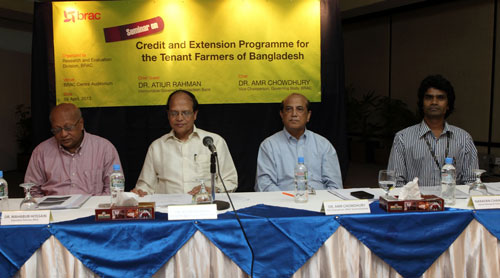
04 April 2013, Dhaka. A seminar on the outcomes of a project undertaken to assist the country’s tenant farmers was held on Thursday (April 4, 2013) at the BRAC Centre Auditorium in the capital.
The ‘Tenant Farmer Development Project’ being implemented since December 2009 is funded by the Bangladesh Bank, gave credit and other supports to the tenant farmers.
The seminar shared the findings of an impact assessment study of the pilot phase of the project.
The programme was attended by the governor of Bangladesh Bank, Dr. Atiur Rahman, as the Guest of Honour and presided over by the vice-chair person of BRAC, Dr. AMR Chowdhury.
At the seminar the executive director of BRAC, Dr. Mahabub Hossian, presented a paper titled ‘Access of tenant farmers to credit and extension services’, while senior research fellow of the organisation Narayan C. Das, read another paper styled ‘Impact of credit on productivity of tenant farmers’.
Dr. Mahabub Hossain in his presentation pointed out that the previous agriculture credit schemes did not see any obvious success to the tenant farmers and that the tenant farmer development program was taken up to address the issue.
Under the program tenant farmers were given credits against minimal interest rate and extension services without any extra charge, he said, adding, ‘fourteen thousand village organisations are currently under the scheme, reaching around three lakh tenant farmers. This success has prompted the disbursement to be raised from 500 crore to 630 crores.’
Such support can free the tenant and marginalized farmers from the moneylenders, Dr. Mahabub said and added, ‘Around 63 per cent of the landless households are now getting loans from NGOs, with 54.8 per cent of the tenant farmers received loans in 2010 compared with 4.5 per cent in 1988.’
Echoing Dr. Mahabub Hossain, Atiur Rahman said, ‘By focusing on the tenant farmers and helping the bottom of the pyramid we will be able to achieve financial inclusion.’
In praise of BRAC’s initiative, he said, ‘When most banks were not ready to organize and handle the share croppers, BRAC came forward to provide loans of which 80 per cent is being used for farming activities.’
BRAC disbursed the credits and managed the funds Bangladesh Bank had allocated under the ‘Tenant Farmer Development Project’.
Five Media Organisations Receive “BRAC Media Award on Tuberculosis”
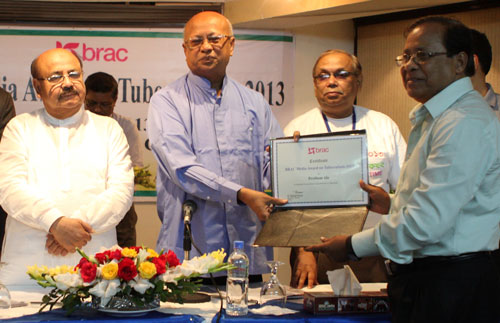
24 March 2013, Dhaka. Five media organisations were rewarded BRAC Media Award on Tuberculosis, honouring their special contribution to tuberculosis prevention and raising awareness on Sunday, March 24, 2013. The winners expressed their strong resolution to continue their work of spreading mass consciousness.
The award recipients were Prothom Alo in the Bengali daily category, The New Age in English daily category, Banglanews24.com in the online news portal category and ATN Bangla in the electronic media category. Bangladesh Television (BTV) received special honour for their contribution to the cause.
Executive Director of BRAC, Dr Mahabub Hossain, presided over the event and Senior Director, Asif Saleh, gave the welcome speech. Farid Hossain, Bureau Chief of AP Bangladesh and Dr Asif Mujtaba Mahmud, Associate Professor of Institute of Epidemiology, Disease Control and Research (IEDCR) also spoke during the event. Thushara Fernando, Country Representative of WHO; Dr Md Ashek Hossain, Director of National Tuberculosis Control Programme and Muzaffar Hossain Paltu, Senior Vice President of NATAB were among the other honourable guests present in the event.
In his presiding speech Dr Mahabub Hossian said that, although Bangladesh stands second in tuberculosis control, the National Tuberculosis Control Programme needs to retain the success. He added that the mass media can play an integral part in this. He also suggested the utilisation of modern technology in tuberculosis control.
Senior director Asif Saleh said that the role of news media is essential in implementing the programmes and in bringing effective changes to the society. Thus, BRAC honours the news media organisations that play a leading role in freeing the country of tuberculosis.
Abdul Quium, Associate Editor of Prothom Alo; Shohel Manjur, Managing Editor of New Age, Juwel Majhar, Consultant Editor of Banglanews, Nowajesh Ali Khan, and Advisor of ATN Bangla received the award. Dr Kawsar Afsana, Director of Health, Nutrition and Population of BRAC received the award on behalf of BTV.
This event marks the third rendition of the ‘BRAC Media Award on Tuberculosis’ after the first one on 2008 and the second on 2012.
Earlier in the day, a rally was organised to observe the World Tuberculosis Day. The rally started from Shahbag, passed through TSC and Doyel Chattar and ended at the National Press Club. Officials of the Ministry of Health and Family Welfare, as well as representatives of various government and nongovernment organisations attended the rally. The slogan of this year’s World Tuberculosis Day was “Stop TB in My Life Time."
BRAC Philippines provides assistance to differently able learner in Maguindanao
17 March 2013, COTABATO CITY. True to its mission of empowering people to realise their potential, BRAC Philippines, through their local partner, Kapagawida Development Services Association, Inc. (KDSAI), provided a wheelchair to a Grade 1 learner in Buluan town who suffers from a congenital mobility impairment.
Seven-year old Alibay M. Katua from Barangay Upper Silling, Buluan, province of Maguindanao, was born with no legs. But the impairment has not hindered her determination to attend school every day.
Her parents, Akmad and Kapisa, are grateful that their daughter has been able to receive education through the BRAC Learning Centre free of cost.
“Providing our daughter with a wheelchair has made a huge difference in her life. Our hearts are overflowing with gratitude,” said an overjoyed Kapisa Katua.
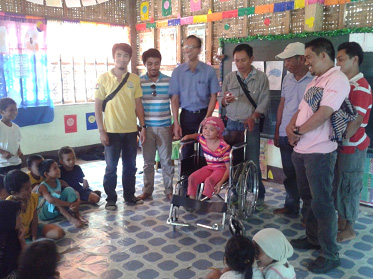
Alibay M. Katua, a mobility-impaired Grade 1 Learner in Brgy. Upper Silling, Buluan, Maguindanao enjoys her new wheelchair from BRAC Philippines.
Rehana Angeles, Alibay’s learning facilitator said, “This act of kindness has given a sense of hope, not only to Alibay’s family, but to all parents who have children with physical needs. BRAC is truly committed to creating an environment free from all forms of discrimination.”
The wheelchair presentation ceremony was attended by Department of Education-Maguindao Division 1 Coordinator for BRAC, Sammy M. Modales; BRAC Philippines Provincial Manager for Maguindanao, Md. Abdullah-Al-Mahtab Khan; Barangay Upper Silling Chairman, Jayson M. Lantong and KDSAI Executive Director Nomairie Mustapha.
The establishment of Upper Silling BRAC Learning Center is part of the Alternative Delivery Model Project under the Basic Education Assistance in Muslim Mindanao (BEAM-ARMM) programme funded by the Australian Agency for International Development (AusAID).
More...
Join the world’s biggest family




